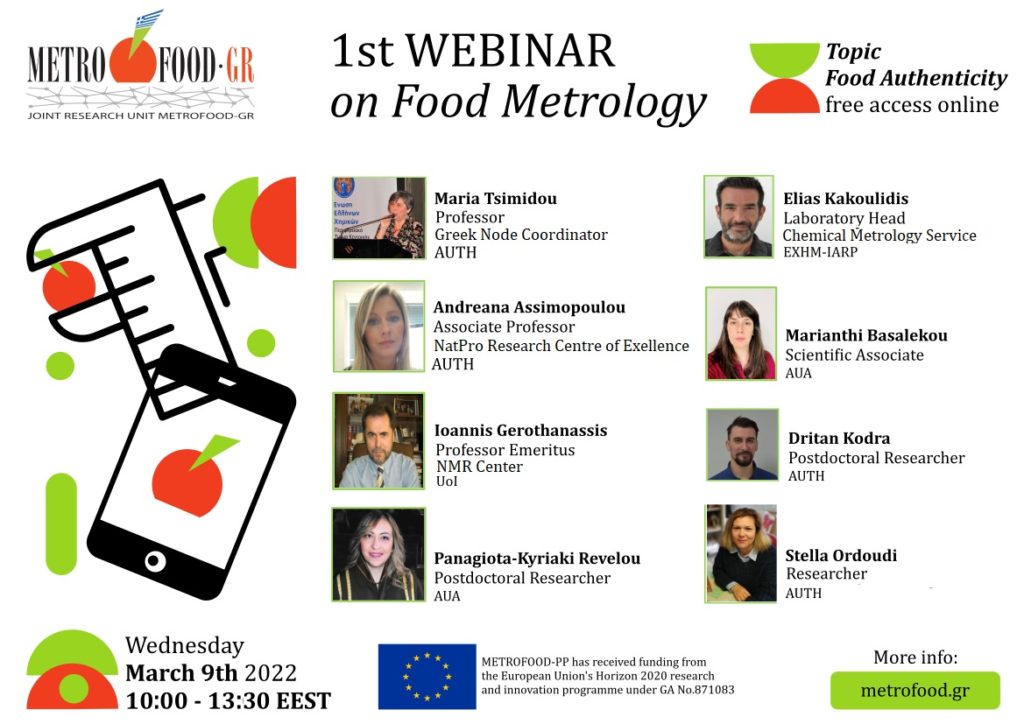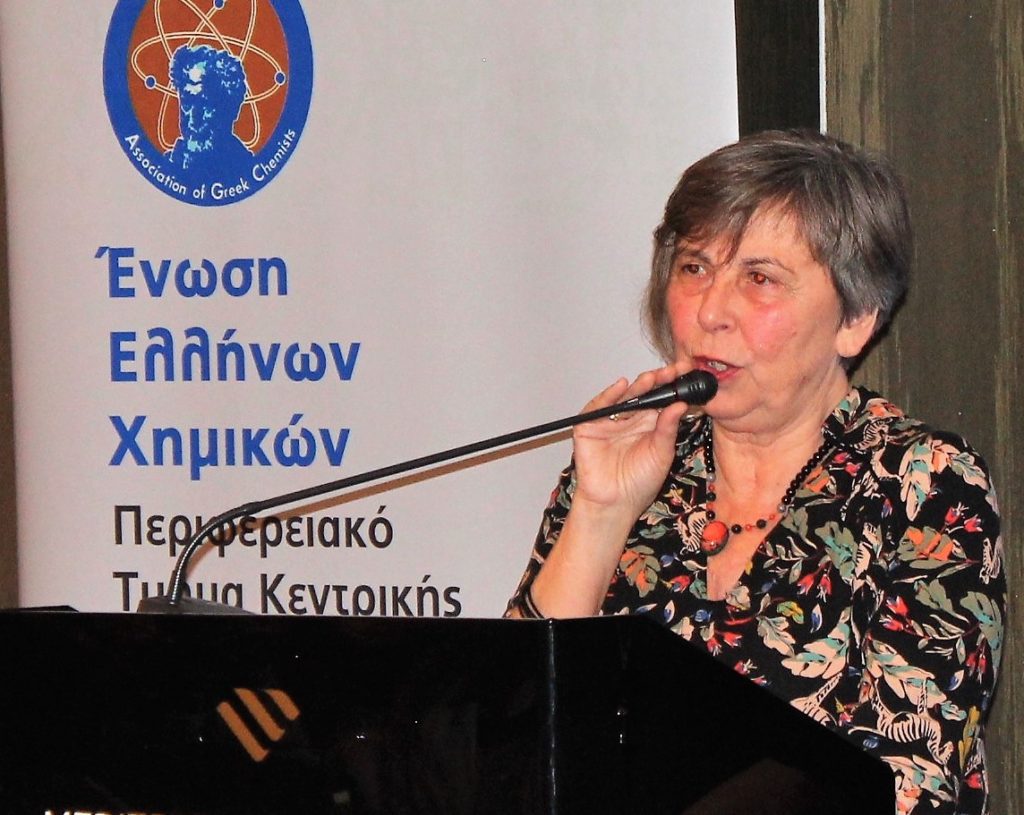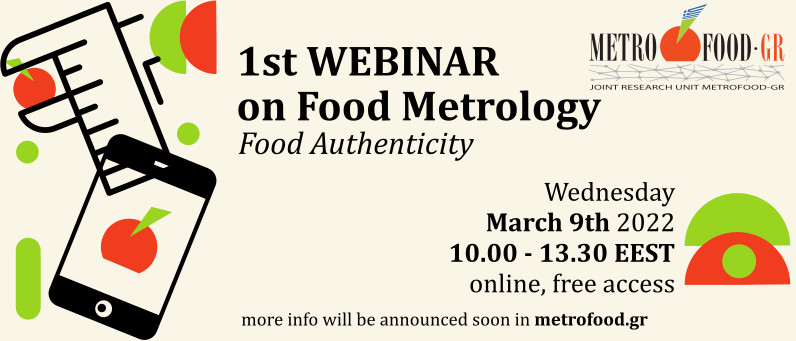The Greek Node of the METROFOOD-RI organizes a series of scientific webinars on Food Metrology. This initiative will be carried out in the frame of the METROFOOD-PP (ESFRI, EU-Horizon 2020) as part of the self-assembly activities of the RI.
The 1st webinar will focus on “Food Metrology – Food Authenticity“ and it will take place on Wednesday, March 9, 2022, at 09.00-13.30 (CET) online (via zoom). The webinar is free-access for young scientists, potential partners of METROFOOD-GR, researchers from Greece and abroad with relevant interests and background.
The speakers, academic professors and professional researchers are all members of the METROFOOD-GR group that are particularly experienced and active in developing and using methods for food authentication or detection of food fraud. They will highlight critical issues that affect the reliability of analytical measurements and present typical examples of application to certain Greek agri-food products. A closing session will be devoted to questions and discussion about the existing capacity, the plans and potential synergistic actions of the METROFOOD-RI in this field of research. Webinar’s language is English.

Programme
Connection details
Webinar is free-acess via Zoom platform No registration needed, simply click on the follwoing link button.
*In case of any inconvenience can use further use the following connection details: Meeting ID: 987 1795 7820 || Passcode: 136687
Speakers

Maria Tsimidou, Coordinator of the METROFOOD-GR, made an introduction about “METROFFOD-RI/METROFOOD-GR – An overview” focusing on thescope and objectives of the RI, the stage of its lifecycle and future perspectives and also how the Greek Node of this European Infrastructure currently self-assemblies to contribute to the provisioned scientific services.
Maria Tsimidou (tsimidou@chem.auth.gr) is a Professor (Emeritus) of Food Chemistry in the School of Chemistry at the Aristotle University of Thessaloniki (AUTH), Greece. She is a Food Chemist (Chemistry Dept, AUTH, Reading Univ) and has a professional career of 42 years (1977-2021). She supervised many post doctorate research projects,PhD, MSc and undergraduate theses, and served as an internal or external examiner of theses and research projects in Greece and abroad. She has published >200 research papers, review articles, and contributions to scientific books and encyclopedias, served as editor to special publications on the above-mentioned topics and participates in relevant projects funded by national and European sources. She held several duties as expert in food chemistry, olive oil, table olives and saffron and was member of different evaluation bodies. Chair of the COST ACTION Saffronomics. Executive Editor in European Journal of Lipid Science Technology (2016-19), Editorial board Molecules, Ex, Advisory Board member in Gracas y Aceites and the Italian Journal of Food Science and Technology, Scientific Responsible for the Greek METROFOOD RI node; other H2020 projects: OLEUM , FNS-Cloud. Participation in the National Roadmap project PLANTUP,member of the excellence center NATROPRO /AUTH. Collaborations internally (within the LAB,The School, Faculty, AUTH), externally with other institutions in Greece and abroad.

Dr. Elias Kakoulides presented issues about “Metrology in the adulteration of foodstuffs”. More specifically, he explained that the main role of metrology institutes regarding food quality and safety is to provide analytical laboratories with tools that ensure the SI traceability and the validity of relevant measurements. Both are supported by means of international comparisons at the highest level on similar subjects organized under the auspices of the BIPM. Examples of selected comparisons pertaining to real food adulteration cases were presented and their results were discussed.

Assoc. Prof. Andreana Assimopoulou spoke about “Challenges and issues in measurement of natural products, food and pharmaceutical matrices”. She highlighted some case studies that affect metrology issues, such as the raw material used, process parameters implemented (drying, grinding, distillation and extraction parameters) that affect quality and metrology, as well as standardization of natural products extracts used for food, cosmetics and pharmaceuticals.
Andreana Assimopoulou is Associate Professor of “Applied Organic Chemistry – Natural Products” at the School of Chemical Engineering, Aristotle University of Thessaloniki (AUTh), Greece. She received her Diploma of Chemical Engineer from the School of Chemical Engineering, AUTh, MSc in “Management of Productive Systems” from the Industrial Management Division, School of Mechanical Engineering, AUTh and PhD from the School of Chemical Engineering, AUTh on Natural Products Chemistry &Technology and Pharmaceutical Technology (“Isohexenylnaphthazarins; Chemistry-Biology-Technology”, 2001). After a two year post Doctoral Fellowship granted by the States Scholarships Foundation, she was elected Lecturer of the School of Chemical Engineering, AUTh. She coordinates the “Natural Products Research Centre of Excellence-AUTh”, at the Center of Interdisciplinary Research and Innovation, that the Aristotle University of Thessaloniki has established since 2015. She is also Vice President of the Center of Interdisciplinary Research and Innovation of AUTh and member of several committees of the University.

Prof. Ioannis Gerothanassis gave a lecture about “Metrology in lipid hydroperoxides: The NMR perspective” and more specifically, various NMR methods that have been applied in the field, NMR spectroscopy in mixture analysis, structural investigations based on quantum chemical calculations of NMR parameters and metabolomics. Emphasis was given to NMR analytical and structural methods which can contribute significantly to the molecular basis of the chemical process involved in the formation of lipid hydroperoxides without the need for the isolation of the individual components. Furthermore, future developments in the field will be discussed
Prof. Dr. Ioannis P. Gerothanassis is Emeritus Professor at the Department of Chemistry, University of Ioannina, Greece. His current research interests include NMR Spectroscopy as applied to Bioorganic Chemistry, Natural Products, Analytical Chemistry, and Structural Biology. He received MSc (1979), PhD (1981) and DSc (2011) from the University of East Anglia, and he is also an Adjunct Professor at the International Center for Chemical and Biological Sciences (ICCBS), University of Karachi. He has over 170 publications in international journals, and over 6200 citations in the international literature. He served also as Rector and Vice Rector of the University of Ioannina and Former Vice Chairman of the Hellenic Quality Assurance & Accreditation Agency (HQA).

Dr. Panagiota-Kyriaki Revelou’s presentation about “Discrimination of botanical origin of olive oil from selected Greek cultivars by SPME-GC-MS and ATR-FTIR spectroscopy combined with chemometrics” is outlined below. Olive oil is Greece’s fourth largest exported product in terms of worth and significance. The aim of this study was the discrimination of olive oil samples from the cultivars Koroneiki, Megaritiki and Amfissis by Solid-Phase Microextraction-Gas Chromatography-Mass Spectrometry (SPME-GC-MS) and Attenuated Total Reflectance-Fourier Transform Infrared Spectroscopy (ATR-FTIR), in combination with chemometrics. Ninety olive oil samples were collected during three harvesting periods from various Greek prefectures. Forty-seven volatile compounds were identified by the SPME-GC-MS technique. The spectra of olive oil samples obtained from the ATR-FTIR technique were similar. The forward stepwise algorithm was applied for the selection of the most significant variables for the botanical discrimination of olive oil samples. One ester ((Z)-3-hexenyl acetate) and three terpenes ((E)-β-ocimene, α-copaene, (E,E)-α-farnesene) were identified from the forward stepwise algorithm based on SPME-GC-MS data, which are related to the plant metabolism. In the ATR-FTIR spectra, the spectral regions chosen from the forward stepwise algorithm, corresponding to the bending vibrations of double bonds (1401 cm-1), cis-double bonds (1417 cm-1) and CH2 aliphatic groups (1460 cm-1), as well as the stretching vibration of the ester carbonyl groups of triglycerides (1743 cm-1). Application of the supervised methods of linear and quadratic discriminant cross-validation analysis, based on SPME-GC-MS data, provided a correct classification score of 97.4 and 100.0%, respectively. The corresponding statistical analyses were used in the ATR-FTIR spectra where 96.1% of samples were discriminated correctly. From the above results, it was concluded that the forward stepwise algorithm provided important information about the variables that are characteristic of the botanical origin of samples, while the discrimination was successful with both SPME-GC-MS and ATR-FTIR techniques. The main advantages of these techniques are laid in the fact that are solvent-free, while the application process is not time-consuming.
Panagiota-Kyriaki Revelou is a Food Technologist with a PhD from the Agricultural University of Athens and a Master’s degree from the National and Kapodistrian University of Athens. For her postgraduate studies she received a scholarship from the State Scholarship Foundation. She has seven years of work experience as a Chemical Analyst in ISO accredited analytical laboratories and three years of research experience as a Postdoctoral Fellow. Today she works as a Postdoctoral Researcher at the Chemistry Laboratory of the Agricultural University of Athens and as an Academic Fellow at the Department of Food Science and Technology of the University of West Attica, teaching three undergraduate laboratory courses. She is a reviewer in three scientific journals and author/co-author of 20 scientific publications with reviewers in international scientific journals as well as 12 posters in international and Greek scientific conferences.

Dr. Marianthi Basalekou, in her lecture about “Authentication of Wine by FT-IR” explained why profile analysis of wine, a product with a complex matrix, is an appealing technique for the simultaneous assessment of the various chemical compounds it contains. FT-IR is highly suitable for this task, however, the large set of data it produces require specific handling. Coupled with chemometrics it can lead to authentication through classification but also through the identification of chemical markers by model development. Experiment set up for classification and model development purposes need to be thoroughly planned in order to achieve successful and repeatable results. Experiments on large sets of data can be used to reveal methods of improvement and explain issues on training, validation and test datasets of models developed
Marianthi Basalekou has a Diploma in Food Science, holds an MSc in Enology-Viticulture and a PhD in Enology (Agricultural University of Athens). She has worked as a Scientific Associate in research programs in Crete (University of Chemistry, Hellenic Mediterranean University) and has taught undergraduate and postgraduate classes (Hellenic Mediterranean University). From 2020 to 2021 she worked as a post-doc student at the Agricultural University of Athens (Department of Chemistry). She has worked as an enologist in Greece and abroad. She is currently working as a Scientific Associate at the University of West Attica (Department of Wine, Vine & Beverage Sciences).sity of Athens (Department of Chemistry). She has worked as an enologist in Greece and abroad. She is currently working as a Scientific Associate at the University of West Attica (Department of Wine, Vine & Beverage Sciences).

Dr. Dritan Kodra, made a “Presentation of the FoodOmics GR Database”, a literature-based public database on food composition of Greek products. It contains concentration values of hundreds of chemical compounds/elements found in more than 12 different types of food of Greek origin, as they are reported in the published articles spanning more than a decade of research. The database is provided through a web interface that allows the user to make queries based on a specific compound/element, the type of food, its region of origin, as well as a combination of the above. The interface provides flexibility and easy access to information to the user that can be traced back to its original source
Dr. Dritan Kodra received his Bachelor’s and Master’s degree from the Department of Physics of Aristotle University of Thessaloniki (AUTH), as well as a Master’s degree and PhD title from the University of Pittsburgh (UPitt) in Pennsylvania USA. He is proficient in computational methods and statistics acquired from a long experience of Dr. Dritan Kodra received his Bachelor’s and Master’s degree from the Department of Physics of Aristotle University of Thessaloniki (AUTH), as well as a Master’s degree and PhD title from the University of Pittsburgh (UPitt) in Pennsylvania USA. He is proficient in computational methods and statistics acquired from a long experience of working with data. He is currently engaged as a postdoctoral researcher in collaboration with the Biomic_AUTh research team, where he utilizes his expertise in projects involving the development and deployment of databases, data mining and text mining techniques, as well as the development and implementation of Machine Learning models.

Dr. Stella Ordoudi presented “Metrological issues in FTIR-based applications for the detection of saffron adulteration with synthetic dyes”. Saffron, the most expensive spice in the world, is a very common target of adulteration by several means. Given that its value depends also on its visual appearance and color, several types of coloring substances have been illegally used so far implying in some cases, possible adverse effects on health. Detection of saffron adulteration that involves coloring of various plant materials with synthetic or other exogenous dyes is complicated because it demands laborious sample preparation and chromatographic separation of the constituents. Non-destructive and high-throughput analysis approaches that employ the FTIR spectroscopy seem a promising alternative to the current ISO-proposed methods of identification of artificial colorants in this spice given that specific spectral acquisition protocols and data analysis methods are followed. Two case studies on FTIR examination of (a) a commercial sample in powder form labeled as “saffron” and identified as a real case of sophisticated adulteration and (b) artificial mixtures of saffron with carminic acid, an insect-derived coloring substance of importance for religious certification of the product, were presented. These applications were critically discussed as to the assessment strategy and method performance characteristics (reproducibiligy, sensitivity, specificity). Further studies will be needed to investigate how FTIR spectroscopy through non-targeted fingerprinting analysis could assist in the accurate detection of saffron adulteration with exogenous dyes.
Dr. Stergiani (Stella) Ordoudi is a Chemist (AUTh), with an MSc in Food Chemistry and Technology and a PhD in Chemistry, holds a professional position as Laboratory Teaching Staff member in the School of Chemistry of AUTh. She has long experience in research about the quality control and authenticity of saffron. Her research activities involve (a) development of screening methods for the assessment of quality, botanical/geographical origin or adulteration markers in flavorings, essential oils, fruit-by-products, (b) exploitation of new sources of natural colorants and antioxidants for food uses (c) improvement of quality & new product development from botanical sources. She has practical experience with analytical techniques (UV-Vis, FL, FTIR, NMR spectroscopy, HPLC-DAD/ FL/RI, LC-MS and GC-FID/MS gas chromatographs, SPE extraction), in vitro antioxidant tests (DPPH, ABTS, ORAC, CBA) and chemometric methods (PCA, LDA, PLS, SIMCA). She has co-authored 26 pee-reviewed articles in international scientific journals, 10 chapters in books/encyclopedias and collective volumes and >50 announcements in national and international scientific conferences. So far, she has participated in 16 scientific projects (6 european, 3 national-regional, 6 industry-service) and 2 COST actions, in collaboration with several research teams and stakeholders from all over Europe. Since 2019, she is member of the Nat-Pro Research Center of Excellence of AUTh and of the research team of AUTh that coordinates the Greek Node of the METROFOOD-RI. all over Europe. Since 2019, she is member of the Nat-Pro Research Center of Excellence of AUTh and of the research team of AUTh that coordinates the Greek Node of the METROFOOD-RI.

I am a student in Agricultural University of Athens(specialized to animals) and I can’t wait to be a viewer in that presentation!